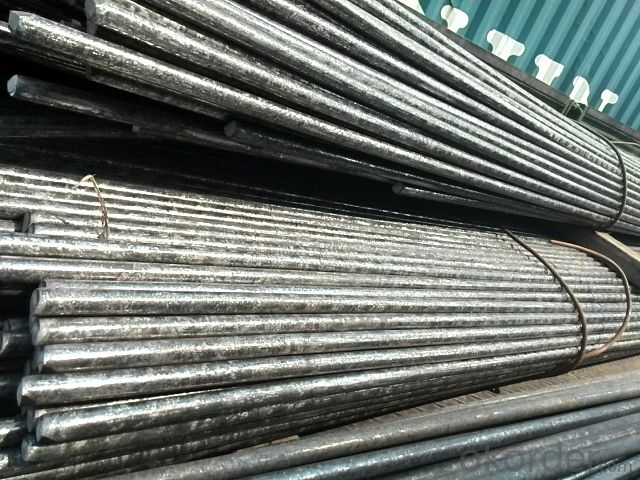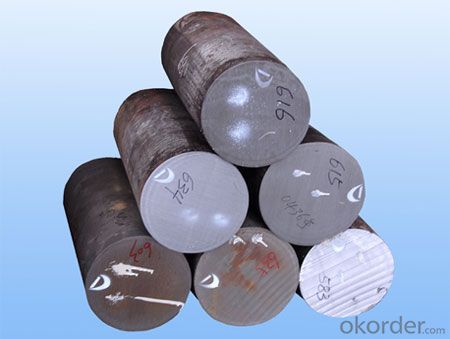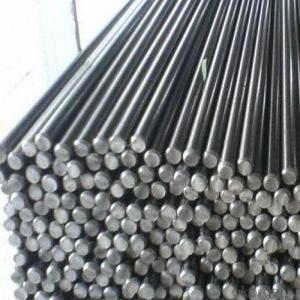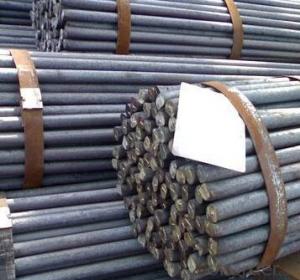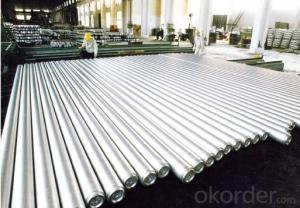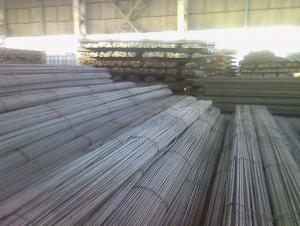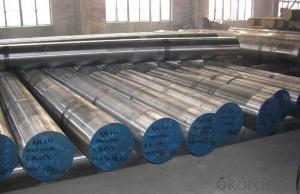Mould Special Steel 60Si2CrA
- Loading Port:
- China Main Port
- Payment Terms:
- TT or LC
- Min Order Qty:
- -
- Supply Capability:
- -
OKorder Service Pledge
OKorder Financial Service
You Might Also Like
Product Description:
OKorder is offering Mould Special Steel 60Si2CrA at great prices with worldwide shipping. Our supplier is a world-class manufacturer of steel, with our products utilized the world over. OKorder annually supplies products to European, North American and Asian markets. We provide quotations within 24 hours of receiving an inquiry and guarantee competitive prices.
Product Applications:
Mould Special Steel 60Si2CrA are ideal for structural applications and are widely used in the construction of buildings and bridges, and the manufacturing, petrochemical, and transportation industries.
Product Advantages:
OKorder's Mould Special Steel 60Si2CrA are durable, strong, and resist corrosion.
Main Product Features:
· Premium quality
· Prompt delivery & seaworthy packing (30 days after receiving deposit)
· Corrosion resistance
· Can be recycled and reused
· Mill test certification
· Professional Service
· Competitive pricing
Product Specifications:
Manufacture: Hot rolled
Grade: Q195 – 235
Certificates: ISO, SGS, BV, CIQ
Length: 6m – 12m, as per customer request
Corresponding Steel Grade for Reference:
CHN, GB | JPN, JIS | GER, DIN | GBR, BS |
60Si2CrA | SWOSC-V | 67SiCr5 | 685H57 |
USA, AISI/SAE/ASTM | ISO | ||
9254 | 55SiCr63 |
Chemical Composition:
C | Si | Mn | S |
0.52~0.60 | 1.5~2.00 | 0.60~0.90 | ≤0.035 |
P | Cr | Ni | Cu |
≤0.035 | ≤0.35 | ≤0.35 | ≤0.25 |
FAQ:
Q1: Why buy Materials & Equipment from OKorder.com?
A1: All products offered byOKorder.com are carefully selected from China's most reliable manufacturing enterprises. Through its ISO certifications, OKorder.com adheres to the highest standards and a commitment to supply chain safety and customer satisfaction.
Q2: How do we guarantee the quality of our products?
A2: We have established an advanced quality management system which conducts strict quality tests at every step, from raw materials to the final product. At the same time, we provide extensive follow-up service assurances as required.
Q3: How soon can we receive the product after purchase?
A3: Within three days of placing an order, we will begin production. The specific shipping date is dependent upon international and government factors, but is typically 7 to 10 workdays.
Q4: What makes stainless steel stainless?
A4: Stainless steel must contain at least 10.5 % chromium. It is this element that reacts with the oxygen in the air to form a complex chrome-oxide surface layer that is invisible but strong enough to prevent further oxygen from "staining" (rusting) the surface. Higher levels of chromium and the addition of other alloying elements such as nickel and molybdenum enhance this surface layer and improve the corrosion resistance of the stainless material.
Q5: Can stainless steel rust?
A5: Stainless does not "rust" as you think of regular steel rusting with a red oxide on the surface that flakes off. If you see red rust it is probably due to some iron particles that have contaminated the surface of the stainless steel and it is these iron particles that are rusting. Look at the source of the rusting and see if you can remove it from the surface.
Images:
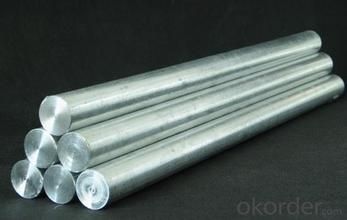
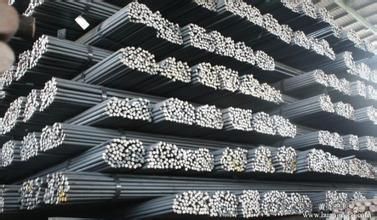
- Q: Can steel round bars be used in the energy industry?
- Steel round bars are indeed applicable in the energy industry. These bars are widely utilized in numerous energy industry applications owing to their exceptional attributes, including high strength, durability, and corrosion resistance. They find extensive use in the construction of power plants, oil rigs, pipelines, and other energy infrastructure projects. Moreover, machinery and equipment employed in the energy industry, such as turbines, generators, and pumps, are also manufactured using steel round bars. Furthermore, renewable energy technologies, including wind turbines and solar power systems, often incorporate steel round bars. In summary, steel round bars offer versatility and reliability, making them a superb choice for meeting the demanding requirements of the energy industry.
- Q: Can steel round bars be heat treated to improve their mechanical properties?
- Yes, steel round bars can be heat treated to improve their mechanical properties. Heat treatment involves heating the steel to a specific temperature and then cooling it at a controlled rate. This process can alter the microstructure of the steel, resulting in improved hardness, strength, and toughness. Different heat treatment methods, such as quenching and tempering, can be applied depending on the desired mechanical properties.
- Q: What are the different grades of carbon steel round bars for structural applications?
- Structural applications offer a variety of grades for carbon steel round bars, each possessing unique properties and characteristics. Some commonly used grades are as follows: 1. ASTM A36: Widely utilized for structural projects, this grade of carbon steel round bars boasts exceptional weldability and machinability. 2. ASTM A572-50: This high-strength, low-alloy structural steel grade provides an improved strength-to-weight ratio compared to traditional carbon steel. It is often employed in construction and structural applications requiring high strength. 3. ASTM A588: Primarily utilized in corrosion-resistant applications, this high-strength, low-alloy structural steel grade demonstrates excellent atmospheric corrosion resistance. It finds frequent usage in outdoor structures like bridges and buildings. 4. ASTM A709: Commonly employed in bridge construction, this high-strength, low-alloy structural steel grade offers outstanding strength, weldability, and toughness, making it ideal for demanding structural applications. 5. ASTM A105: This low-carbon steel grade possesses good strength and impact resistance, making it suitable for applications necessitating high strength and ductility, such as heavy equipment and machinery construction. These examples represent a limited selection of carbon steel round bar grades available for structural applications. The selection of an appropriate grade depends on factors including desired strength, weldability, machinability, and corrosion resistance. It is advisable to consult with a steel supplier or engineer to determine the most suitable grade for a specific application.
- Q: What is the maximum weight capacity of a steel round bar?
- The maximum weight a steel round bar can hold depends on several factors, including its diameter, length, grade, and type of steel. Steel round bars are available in various sizes and grades, each with its own load-bearing capacity. To determine the maximum weight a steel round bar can handle, you need to calculate its cross-sectional area using the formula: Area = π * (diameter/2)^2. Here, π represents a mathematical constant that is approximately equal to 3.14159. Once you have the cross-sectional area, you can estimate the weight of the bar by multiplying it with the density of the specific steel grade. The density of steel varies based on the grade, but as a general approximation, it is around 7850 kilograms per cubic meter (or 0.00785 grams per millimeter cubed). However, it's important to remember that weight capacity alone may not be the only factor to consider for the safe use of a steel round bar. Other factors like load distribution, applied forces, and the structural integrity of the bar are equally important to ensure safe operation. For accurate weight capacity information for a specific steel round bar, it is recommended to refer to the manufacturer's specifications or consult a qualified engineer or professional who can provide precise calculations based on the specific requirements and characteristics of the steel round bar in question.
- Q: Are steel round bars prone to deformation?
- Yes, steel round bars can be prone to deformation under certain conditions. Factors such as excessive heat, extreme pressure, or improper handling can cause steel round bars to bend, warp, or twist. However, when manufactured and used properly, steel round bars are highly durable and resistant to deformation.
- Q: How to distinguish a round bar from forging? Cold drawing? Hot rolling?
- Hot rolled round steel, used in construction and general hardware parts processing is very common. Cold drawn round steel (do not know is not cold dial round bar). But I understand by the cold dial round bar Also mainly used in hardware parts processing and production. Such as hinge shaft core or other surface and diameter requirements of production and processing occasions.
- Q: What is the difference between a centerless ground and a polished steel round bar?
- A centerless ground steel round bar and a polished steel round bar are both types of steel bars that have undergone different finishing processes, resulting in distinct qualities and characteristics. A centerless ground steel round bar is produced by grinding the surface of the steel bar using a specialized machine called a centerless grinder. This process removes any imperfections or irregularities on the surface, resulting in a smooth and uniform finish. The centerless grinding process also ensures that the diameter of the bar remains consistent throughout its length. This makes centerless ground steel round bars ideal for applications that require precise dimensions and a smooth surface, such as in machining operations or as a base material for further processing. On the other hand, a polished steel round bar is achieved through a polishing process, where the surface of the steel bar is buffed and polished using abrasive materials. This process helps to enhance the aesthetic appearance of the steel bar, giving it a shiny and reflective surface. Unlike centerless grinding, polishing does not involve removing material from the surface but rather smoothing and refining it. Polished steel round bars are often used in decorative applications, such as in architecture, interior design, or as components in high-end furniture. In summary, the main difference between a centerless ground steel round bar and a polished steel round bar lies in the finishing process. Centerless grinding focuses on achieving precise dimensions and a smooth surface, making it suitable for functional applications. On the other hand, polishing aims to enhance the visual appeal of the steel bar, making it more suitable for decorative purposes.
- Q: Can steel round bars be plated with other metals?
- Yes, steel round bars can be plated with other metals. Plating is a process in which a thin layer of one metal is applied to the surface of another metal. This is commonly done to enhance the appearance of the steel round bar or to provide it with additional properties such as corrosion resistance or improved conductivity. The plating process involves immersing the steel round bar in a solution that contains ions of the desired metal. Through the use of electrical currents or chemical reactions, the metal ions are deposited onto the surface of the steel, forming a thin and uniform coating. Popular metals used for plating steel round bars include nickel, chrome, zinc, and copper. Plating is a versatile and cost-effective method to improve the performance and aesthetics of steel round bars for various applications.
- Q: Are steel round bars used in the automotive industry?
- Steel round bars are widely utilized in the automotive industry. They find their application in diverse areas like the production of engine components, suspension systems, chassis, and axles. Due to their exceptional strength, durability, and versatility, steel round bars are highly favored for automotive parts that demand exceptional performance and reliability. Moreover, steel's capacity to endure heavy loads and its resistance to deformation make it well-suited for critical automotive applications prioritizing safety.
- Q: How do you prevent rusting of steel round bars?
- To prevent rusting of steel round bars, it is essential to apply protective coatings such as paint, epoxy, or galvanization. Regularly cleaning the bars and keeping them dry, particularly in humid environments, can also help prevent rust formation. Additionally, storing the bars in a controlled indoor environment or using moisture-absorbing materials like silica gel packets can further prevent rusting.
Send your message to us
Mould Special Steel 60Si2CrA
- Loading Port:
- China Main Port
- Payment Terms:
- TT or LC
- Min Order Qty:
- -
- Supply Capability:
- -
OKorder Service Pledge
OKorder Financial Service
Similar products
Hot products
Hot Searches
Related keywords



